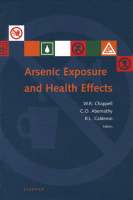Browse content
Table of contents
Actions for selected chapters
- Full text access
- Book chapterNo access
Keyword Index
Pages 415-416
About the book
Description
The Society of Environmental Geochemistry and Health (SEGH) Third International Conference on Arsenic Exposure and Health Effects was held from July 12-15, 1998 in San Diego, California. Several outstanding papers and posters generated lively discussion and debate not only about scientific issues but also about policy and regulatory issues.
While developed countries are considering spending perhaps billions of dollars per year to reach concentrations of 10 micrograms per liter or less, countries like Bangladesh, India and China are trying to deal with much more severe, epidemic scale, arsenic problems with millions of dollars or less.
Like its predecessors in 1994 and 1995, The Third SEGH International Conference on Arsenic Exposure and Health Effects (1998) continued the theme of global impact of arsenic. In addition, two new countries with significant arsenic problems, Inner Mongolia and Bangladesh, were represented. The Bangladesh problem could be larger than the one in West Bengal with a possible two-thirds of the population at risk. The conference also featured a session on mechanisms of cancer carcinogenesis. Several scientists presented their work on this important issue which is central to considerations of such questions as the shape of the dose-response curve at low doses. This latter issue was featured in the final session of the conference. Another session that was new and of great interest was on the treatment of victims of chronic arsenic poisoning.
This was the most dynamic conference to date and this resulting monograph represents the state-of-the-art in arsenic research on a worldwide basis. It will contribute to the solution of the many problems caused by arsenic exposure throughout the world.
The Society of Environmental Geochemistry and Health (SEGH) Third International Conference on Arsenic Exposure and Health Effects was held from July 12-15, 1998 in San Diego, California. Several outstanding papers and posters generated lively discussion and debate not only about scientific issues but also about policy and regulatory issues.
While developed countries are considering spending perhaps billions of dollars per year to reach concentrations of 10 micrograms per liter or less, countries like Bangladesh, India and China are trying to deal with much more severe, epidemic scale, arsenic problems with millions of dollars or less.
Like its predecessors in 1994 and 1995, The Third SEGH International Conference on Arsenic Exposure and Health Effects (1998) continued the theme of global impact of arsenic. In addition, two new countries with significant arsenic problems, Inner Mongolia and Bangladesh, were represented. The Bangladesh problem could be larger than the one in West Bengal with a possible two-thirds of the population at risk. The conference also featured a session on mechanisms of cancer carcinogenesis. Several scientists presented their work on this important issue which is central to considerations of such questions as the shape of the dose-response curve at low doses. This latter issue was featured in the final session of the conference. Another session that was new and of great interest was on the treatment of victims of chronic arsenic poisoning.
This was the most dynamic conference to date and this resulting monograph represents the state-of-the-art in arsenic research on a worldwide basis. It will contribute to the solution of the many problems caused by arsenic exposure throughout the world.
Details
ISBN
978-0-08-043648-7
Language
English
Published
1999
Copyright
Copyright © 1999 Elsevier Ltd. All rights reserved
Imprint
Elsevier Science
